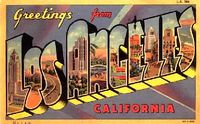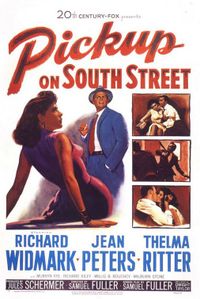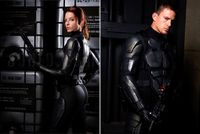I am at Left Coast Crime and a woman just asked me "do you know any agents who specialize in Jewish psychic detectives?"
"No," I said. "But I am curious why you asked me."
"You're Jewish and you write Monk."
Sent via BlackBerry by AT&T
#1 New York Times Bestselling Author & TV Producer
I am at Left Coast Crime and a woman just asked me "do you know any agents who specialize in Jewish psychic detectives?"
"No," I said. "But I am curious why you asked me."
"You're Jewish and you write Monk."
Sent via BlackBerry by AT&T
 Last summer, Mystery Readers Journal devoted an issue to Los Angeles and my contribution was to share the many ways I have described the city in my books. The following is an excerpt from that article.
Last summer, Mystery Readers Journal devoted an issue to Los Angeles and my contribution was to share the many ways I have described the city in my books. The following is an excerpt from that article.
I grew up near
San Francisco, a city with enormous charm and character, a definite center and,
thanks to the Bay and the Pacific, obvious borders. San Francisco is a city
with such a strong, undeniable personality, that it almost feels like a person
to me instead of a place. I assumed, in my inexperience and youth, that all of
the great cities of the world would be like that. And I eventually learned
that, for the most part, I was right.
But not Los
Angeles.
When I first
arrived here in 1980 to go to UCLA, all I saw was endless sprawl, about as
colorful and inviting as a parking lot. It was a city seemingly without shape,
boundaries or a personality that I could identify. I was lost within it, unable
to find its center or my own.
I eventually
realized that I was looking at the city all wrong. It was a mistake to try to
grasp the enormity of it, to see it all in my mind. There’s a reason that L.A.
is where movies and TV shows are made. The city is a soundstage, a green
screen, a back-lot. It’s city that’s remade every day, where history is
measured in increments on a parking meter. I had to make the city my own, and I
did that through my fiction and screenplays.
So perhaps the
best way to understand how I see Los Angeles, and my relationship with it, is
by looking at how I’ve written about it in my books over the years. Here are
some examples:
“It was
a clear, crisp day in the San Fernando Valley. A rainstorm had flushed all the
gunk out of the air and onto the streets, where it washed into the drains and
poured into the Santa Monica Bay, poisoning the water and prompting the closing
of ten miles of prime beachfront. Days in L.A. didn’t come any nicer than
this.” Beyond the Beyond“The
ground isn’t supposed to move. Everyone knew that. It was arrogance, and more
than a little stupidity, to stay in a place where it did. But what was
Hollywood without arrogance and stupidity? You couldn’t manufacture dreams if
you weren’t willing to live in one yourself,” The Walk“Beyond
the TV and film locations, the most interesting and significant landmarks in
the city were as transitory and disposable as the historical record they were
printed on—-the slim ‘Maps to the Stars’ Homes’ distributed by bored Latinos
sitting on folding beach chairs at street corners and freeway off-ramps,” The Walk“[He]
watched Spring Dano jog down the grassy median of San Vicente Boulevard, her
breasts as solid and immovable as the Statue of Liberty’s. One a sunny day,
tanned, perfect babes and tanned, perfect hunks jogged up and down the median,
from Barrington to Ocean Avenue in Santa Monica, hoping to get noticed. […] The
median was one of the great, unpublicized short-cuts into the entertainment
industry. If you distracted an agent, producer, or director long enough to get
him involved in a major traffic accident, you were on your way to a walk-on
role in a series or a weekend read of your spec script.” Beyond the Beyond“Even
without a sign, he would’ve known he was in Little Tokyo. On the south side of
the street, a recreation of a wooden watchtower marked the entrance to a
mini-mall designed to resemble an authentic Japanese village, at least as it
would have been if built by a Winchell’s Donuts franchisee,” The Walk“The
only natural source of water in the valley was the Los Angeles River, which
remained bone dry half the year, only to swell in the winter as much as
three-thousand fold in a single rainy day. As much as Los Angelenos craved
water, they didn’t appreciate the unpredictability of the river and treated it
as they would any other piece of land. They paved it,” The Walk“The
name of their [apartment] building was written diagonally across the front in
plywood script and punctuated with a starburst lamp. The building was a
rectangular stucco box disguised with enormous wooden fins that made the
tenants feel as if they were living in the trunk of a 1959 Cadillac,” Diagnosis Murder: The Past Tense“The Old
Money felt that when the valley’s rich had real money and actually mattered,
they’d move to one of the Bs – Brentwood, Beverly Hills, or Bel-Air. Until
then, they deserved the valley,” The Walk“It’s a
real nice drive through the Santa Monica Mountains, with lots of charred trees
and blackened earth from the annual wildfires to look at. You also pass some
dramatic gouges and gashes in the hillsides from the seasonal mudslides. It’s
not the place I’d pick to build my secluded mansion, but I’m not a rich movie
star or studio executive,” The Man with
the Iron-On Badge
“He
stayed several cars behind her as she cruised Pacific-bound on Jefferson,
across the wide-open marshland, the most valuable, undeveloped property in Los
Angeles. The land had been earmarked for
decades as the site of an ambitious, upscale neighborhood of towering
condos, exclusive beaches, swank shopping, and private marinas, but was mired
in legal challenges, zoning ordinances, and politics. For now, the land was
home to cancerous ducks, corpulent mosquitoes, and chunks of sewage that
dropped from incoming jets like shit from a pterodactyl.” My Gun Has Bullets
Leonard Nimoy guest-stars in William Shatner’s TJ HOOKER, the cheesiest cop show of all-time.
 It's only 12:45 and already I've encountered more incompetence than I can take in one day. First, I went to Office Depot to get a few reams of their brand of copy paper. I had a coupon for 15% off on each ream. So I picked up a box containing three reams of their brand. When I went to the counter, the clerk told me the box didn't qualify because the coupon was only good for reams of paper.
It's only 12:45 and already I've encountered more incompetence than I can take in one day. First, I went to Office Depot to get a few reams of their brand of copy paper. I had a coupon for 15% off on each ream. So I picked up a box containing three reams of their brand. When I went to the counter, the clerk told me the box didn't qualify because the coupon was only good for reams of paper.
"The box contains three reams," I said.
"But they are in a box," she said.
"But it's still three reams," I said. "It says so right here on the side. There's even an illustration."
"You have to go back and bring three reams of paper to the counter."
"It's the same thing," I said. "Can't you just ring me up for three reams?"
"No, because the box is cheaper than getting three individual reams."
It turns out that, with my discount coupon, the difference in cost between the box of three reams and three individual reams was a wash.
"So, in other words, the discount coupon doesn't offer any discount at all," I said.
"It does if you were going to buy three reams separately instead of in a box."
"Why would you want to do that?"
"To get the discount," she said.
When I got home, my copy of Adobe InDesign CS4 arrived. I immediately installed it on my desktop computer. Or at least I tried. Midway through the installation, I got the error message:
Setup has encountered an error and cannot continue. Contact Adobe Customer Support for assistance.
I disabled all my antivirus software, made sure no other applications were running, rebooted the computer, and tried again. Same problem. So I went to the Adobe website to see if they had any articles or FAQs dealing with my installation problem. They didn't. So I called customer support and got a guy in India with an accent so thick that it was nearly impossible to understand a word he said. I made him repeat everything, which seemed to piss him off. On top of that, he couldn't understand anything I was saying, which pissed me off. It took us a half hour just get through my name, address, phone number, etc. When I finally told him my problem, he made me repeat the error message…which, of course, he got wrong. So we spent another ten minutes going through it, letter by letter, word for word. When that was done, he put me on hold so he could talk to an advisor. When he got back, he suggested that I go to the website for help.
"I did that already," I said. "That's why I called you."
"And that didn't resolve the problem?"
'Oh yes, it did, I just decided to call you for fun."
"I'm glad we could help, sir."
"I'm joking. Of course it didn't resolve my problem. That's why I am calling you."
He put me on hold to talk to an advisor. When he came back, he told me he had a solution. He told me to go to the Adobe website.
"I've already done that," I said.
He gave me a web address. I typed it. It led to an article on the Adobe website that had nothing to do with another piece of software on a different operating system.
"That article doesn't deal with my problem," I said.
"Have you already gone through the steps in the article?"
"No, because it's about a different piece of software on a different operating system."
"Are you sure?"
"Yes, I am," I said. "Do you know what software we are talking about?"
He put me on hold to talk to an advisor. When he came back, he suggested that I go to the Adobe website.
"We just did that," I said.
He gave me a different web address that led to a different article. At least this one dealt with my software…but still on a different operating system.
"Do you personally have any idea how to solve my problem or not?" I asked.
"No, I do not," he said.
"What about your advisor?"
He put me on hold ot talk to an advisor, then came back.
"No, he doesn't know either," he said. "You should try the steps in the article."
"But it's about Windows XP and I am on Windows 7."
"It's the best we can do at this time," he said. "Have I resolved your problem?"
"Oh yes, everything is much better now."
"I'm glad we could help," he said. "Have a nice day."
I gave up. I've managed to install the software on my laptop but not my desktop computer. But what is the point of calling customer support if the support personnel don't know anything about the software they are supporting?
 Tonight's showing in my personal film noir film festival was Sam Fuller's PICKUP ON SOUTH STREET starring Richard Widmark as a two-bit pick-pocket who lifts a billfold from a lady's purse on the subway. The billfold contains a stolen film-strip containing a top secret government formula that the woman was unknowingly delivering to the Commies for her ex-boyfriend, a Red spy. It's a silly plot device in what is otherwise a down and dirty crime movie. The high point of the film is an amazing performance by Thelma Ritter as an aging street peddler of neckties and information. Ritter is funny, touching, and genuinely moving…and once she is gone, the movie loses much of its edge and its heart. Even so, I really enjoyed it.
Tonight's showing in my personal film noir film festival was Sam Fuller's PICKUP ON SOUTH STREET starring Richard Widmark as a two-bit pick-pocket who lifts a billfold from a lady's purse on the subway. The billfold contains a stolen film-strip containing a top secret government formula that the woman was unknowingly delivering to the Commies for her ex-boyfriend, a Red spy. It's a silly plot device in what is otherwise a down and dirty crime movie. The high point of the film is an amazing performance by Thelma Ritter as an aging street peddler of neckties and information. Ritter is funny, touching, and genuinely moving…and once she is gone, the movie loses much of its edge and its heart. Even so, I really enjoyed it.
 Roy Scheider once complained on SEAQUEST that he was a live actor stuck in an animated cartoon. That's how the cast of GI JOE must have felt… only much, much more strongly.
Roy Scheider once complained on SEAQUEST that he was a live actor stuck in an animated cartoon. That's how the cast of GI JOE must have felt… only much, much more strongly.
At least 90% of the movie –100 % if you include the computer-generated sets — is a cartoon with a few living, breathing people (the actors at least, not their characters) matted in. There wasn't even an attempt to make the animated/CGI portions appear the slightest bit realistic (or the characters, for that matter).
The best parts of the movie — and I use the terms "best" and "movie" very loosely — are the computer-generated battles. When the CGI action stops for some "emotional" moments, the movie becomes unbearably dull. The backstory flash-backs are so heavy-handed, cliche-ridden and obvious that I found myself longing for the CGI to return. The comedy bits, mostly lame one-liners badly delivered by Marlon Wayons, portraying a steroid-pumped Stepin Fetchit, were only slightly less painful. Marlon wasn't the only guy playing a caricature, not by far (I kept waiting for the sharpnosed, penny-pinching Jew to show up). With the emphasis on CGI, caricature seems to be all that's left to quicky and effectively convey character…or at least what passes for it.
CGI is no longer a tool in story-telling — it has become the story-telling. It's the Michael Bayification of cinema. Who needs acting, character, plot or the emotional investment of the audience when you have CGI? Every big movie coming out of Hollywood now is a videogame or a toy commercial masquerading as a film. A movie can be big without being 99% CGI and 1% cardboard characters.
On the way to the theater, my wife and I remembered how we used to go to the movies every week. Now months can go by without us seeing a movie. What changed? Well, watch GI JOE and you'll see.
I'm sure GI JOE will make 100 gazillion dollars…and its a damn shame.
 The 2009 Scribe Awards were handed out a ceremony and panel at Comic Con in San Diego on Friday. Participants included James Rollins, Max Allan Collins, Tod Goldberg, Matt Forbeck and Keith R.A. DeCandido, who was honored as this year's Grandmaster for excellence in the field. The winning books are marked with asterisks.
The 2009 Scribe Awards were handed out a ceremony and panel at Comic Con in San Diego on Friday. Participants included James Rollins, Max Allan Collins, Tod Goldberg, Matt Forbeck and Keith R.A. DeCandido, who was honored as this year's Grandmaster for excellence in the field. The winning books are marked with asterisks.
GENERAL FICTION
BEST NOVEL—ORIGINAL
**CSI: HEADHUNTER by Greg Cox
BURN NOTICE: THE FIX by Tod Goldberg
CRIMINAL MINDS: FINISHING SCHOOL by Max Allan Collins
BEST NOVEL—ADAPTED
**INDIANA JONES AND THE KINGDOM OF THE CRYSTAL SKULL by James Rollins
DEATH DEFYING ACTS by Greg Cox
THE TUDORS: KING TAKES QUEEN by Elizabeth Massie
THE WACKNESS by Dale C. Phillips
THE X FILES: I WANT TO BELIEVE by Max Allan Collins
SPECULATIVE FICTION
BEST NOVEL—ORIGINAL
**STAR TREK TEROK NOR: DAY OF THE VIPERS by James Swallow
GHOST WHISPERER: REVENGE by Doranna Durgin
RAVENLOFT: THE COVENANT, HEAVEN'S BONES by Samantha Henderson
STARGATE SG-1: HYDRA by Holly Scott20& Jaime Duncan
BEST NOVEL—ADAPTED
**HELLBOY II: THE GOLDEN ARMY by Bob Greenberger
THE MUTANT CHRONICLES by Matt Forbeck
STAR WARS—THE CLONE WARS: WILD SPACE by Karen Miller
UNDERWORLD: RISE OF THE LYCANS by Greg Cox
YOUNG ADULT—ALL GENRES
BEST NOVEL—ORIGINAL
**PRIMEVAL: SHADOW OF THE JAGUAR by Steven Savile
DR. WHO: THE EYELESS by Lance Parkin
DISNEY CLUB PENGUIN: STOWAWAY! ADVENTURES AT SEA by Tracey West
BEST NOVEL—ADAPTED
**JOURNEY TO THE CENTER OF THE EARTH 3D by Tracey West
IRON MAN: THE JUNIOR NOVEL by Stephen D. Sullivan
THE DARK KNIGHT: THE JUNIOR NOVEL by Stacia Deutsch and Rhody Cohon
THE GRANDMASTER AWARD
KEITH R.A. DeCANDIDO
(Pictured above: Max Allan Collins, Matt Forbeck, James Rollins, Stacia Deutsch, Tod Goldberg, Keith R.A. DeCandido, Robert Greenberger and Nathan Long)
I love Roger Ebert's review of TRANSFORMERS 2.
"Transformers: Revenge of the Fallen" is a horrible experience of unbearable length, briefly punctuated by three or four amusing moments. One of these involves a dog-like robot humping the leg of the heroine. Such are the meager joys. If you want to save yourself the ticket price, go into the kitchen, cue up a male choir singing the music of hell, and get a kid to start banging pots and pans together. Then close your eyes and use your imagination.
Not that I had any intention of seeing it anyway. I saw TRANSFORMERS 1…and that was enough.